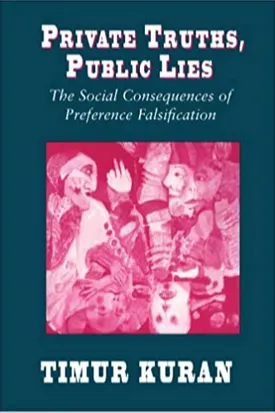Private Truths, Public Lies: The Social Consequences of Preference Falsification by Timur Kuran
When it comes to leading a successful and fulfilling life, understanding the power of sincerity and honesty is key. However, Timur Kuran’s 1998 book “Private Truths, Public Lies” examines how people often don’t act in their own self-interest and instead resort to lying or falsifying preferences to maintain a semblance of social acceptance.
Kuran argues that people can find themselves in situations that require them to publicly disagree with their own private beliefs and desires, thus creating an environment of preference falsification. This so-called “veil of conformity” serves to hide the true opinion of individuals and creates a false picture of the collective preferences. As such, Kuran argues that this can have a significantly damaging effect on collective decision making.
Kuran believes that preference falsification is rooted in cultural, historical, and economic factors, and the book makes a point of examining the asymmetric nature of power. Kuran shows that in many cases, individuals have to choose between fulfilling one’s own self-interests, or conforming to the collective majority in order to be accepted, or even to survive. In this way, even the most basic rights can be compromised — from the freedom to spend money and the freedom to marry whom one chooses, to the freedom to vote and the freedom to speak truthfully.
Kuran maintains that preference falsification can have adverse consequences in both the private and public realms. In the private realm, it can lead to a less productive market economy and decreased social and economic gains. In the public realm, such widespread falsification of opinions can lead to important issues being left unaddressed and political decisions being made without the public’s true opinion being taken into consideration.
In essence, this book serves as an important study into the power of conformity and its potential social and economic consequences. Kuran carefully considers the way in which individuals strive to simplify the process of decision-making, only to realize that their decisions no longer reflect who they truly are. Though certainly disheartening, his work presents a powerful argument for the need for greater individual action and consciousness in determining the future of our society.
For readers looking for a comprehensive overview of the power of preference falsification, Kuran provides an extensive discussion that no other book is able to do. With an expansive range of topics from the source of preference falsification, its consequences, and the potential for change, this book presents the material in an accessible, easy to understand way. It acts as a reminder of the power of conformity and the need for deeper consideration in the way we think, act, and decide.

